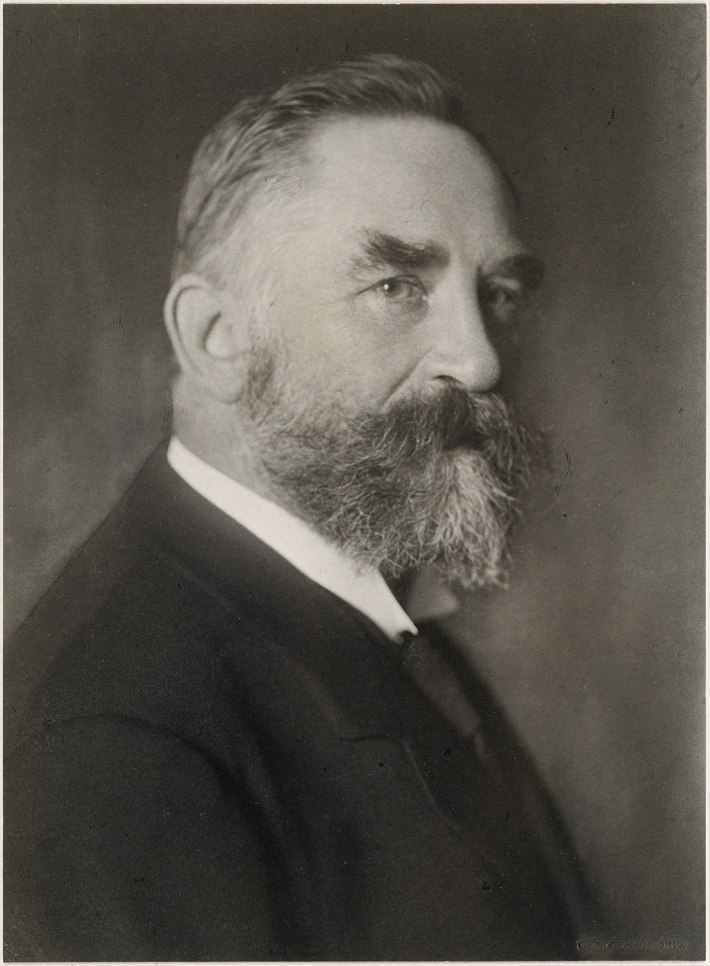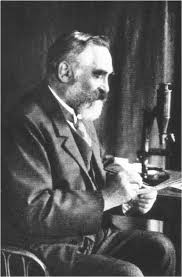
“We form ties with animals and plants and also with nonorganic bodies, into which last we merge after death”
Constantin von Monakow (1853-1930) was a neurobiologist who set out an organic scientific theory with important political implications.
He developed the idea of the horme, an all-pervading intrinsic motivating and guiding force which he described as “the primal mother of instinct”. (1)
Monakow explained: “The horme is nothing other than the activity of the universe (Worldhorme), within which we human-children are highly organized necessary parts.
“As such we are temporally and partly also spatially – through free mobility – closely bound up with one another: we form ties with animals and plants and also with nonorganic bodies, into which last we merge after death.
 “There is an undeniable glory in the thought that an indelible temporal bond links us, not only with our ancestors and our descendants, but above all also with the whole rest of the organic world”. (2)
“There is an undeniable glory in the thought that an indelible temporal bond links us, not only with our ancestors and our descendants, but above all also with the whole rest of the organic world”. (2)
Monakow’s aim was “a naturalization of morality” (3) an idea in tune with the nature-based anarchist ethics developed by Peter Kropotkin.
He identified a principle he called the syneidesis or “biological conscience” whose purpose was to intervene in moments of imbalance and nudge the organism back into order.
For him, human conscience – our sense of right and wrong – was nothing less than the conscious aspect of this syneidesis, the highest form of the biological principle of auto-regulation.
Explains Harrington: “For Monakow, recognizing this gave intuitive judgment in moral decision-making an authority that was rooted in the cosmic life drive itself: an authority far above that of reason and sense”. (4)
The answer to humankind’s problems was therefore not yet more technology and social planning, but trust in its own deepest biological instincts.
 All the wisdom and goodness that human beings required in life, on an individual and collective level, was already pulsing in the protoplasm of their cells.
All the wisdom and goodness that human beings required in life, on an individual and collective level, was already pulsing in the protoplasm of their cells.
“Every tiny living fiber in us” was, according to Monakow, “so much more wonderful than all the wonders of technology and a thousand times more clever”. (5)
He broke down the influence of the horme into a series of instincts, ranging from the most basic biological urges to the highest impulses.
The first was to grow according to one’s inner plan, the second was self-preservation, the third was reproduction via sexuality, the fourth was a feeling of connection with a social group and the fifth was the instinct to strive for holistic unity with the cosmos.
Because these higher instinct were part of our biological reality, the pursuit of morality and ethics did not involve, as was often said, suppressing our natural instincts.
Instead it was a question of allowing our superior instincts for selfless and ethical behaviour to predominate over the lower, basic, self-centred impulses.
This obviously had political implications, placing blinkered individualism and nationalism on a lower rung of evolution than an enlightened universal perspective.
 Writes Harrington: “For Monakow, international community was not a thing of human reason but rather of mystical necessity – the ‘natural’ culmination of a holistic world view in which all living creatures were united in the cosmic dynamic of hormic evolution”. (6)
Writes Harrington: “For Monakow, international community was not a thing of human reason but rather of mystical necessity – the ‘natural’ culmination of a holistic world view in which all living creatures were united in the cosmic dynamic of hormic evolution”. (6)
Monakow’s belief in the coherence and purpose of nature as a living organism inevitably led him to oppose the state, with its unnecessary and destructive aim of regulating and controlling a world that was capable of thriving perfectly well, indeed much better, without it.
He warned: “Do you see the marvelous wing-breadth and effortless gliding and sudden directed swoop of wild birds? Compare that to the waddling and anxious hopping-flight in the hen yard! Such a fate awaits a humanity that has been massively provided for through the State!” (7)

The Swiss-Russian Monakow was vehement in his dislike of the Americanization of European culture, which he described as a “triumph of infantilism” (8) and also of the industrial-capitalist Machine Age with which it went hand in hand.
A friend later recalled how he regarded technology as something unfruitful, even destructive. He would counter arguments that it gave human beings more free time by asking cuttingly: “Time for what? Spent how?” (9)
The Swiss novelist Maria Waser wrote of Monakow’s “pure understanding of the divine unity of all that is living”. (10)
In her 1933 tribute to him, she declared: “We had fallen into a state of disorder; he knew the plan and the secret will of the Living Principle. We were alienated from Nature; he stood as one initiated in the middle of her shrine. We were cheerless, but he knew the greatest joy”. (11)

1. Constantin von Monakow & R. Mourgue, Biologische Einführung in das Studiums der Neurologie und Pscyhopathologie (Stuttgart: Hippkrates-Verlage, 1930), cit. Anne Harrington, Reenchanted Science: Holism in German Culture from Wilhelm II to Hitler (Princeton, NJ: Princeton University Press, 1999), p. 89.
2. Maria Waser, Begegnung am Abend: Ein Vermächtnis (Stuttgart: Deutsche Verlags-Anstalt, 1933), p. 265, cit. Harrington , p. 92.
3. Harrington, p. 94.
4. Harrington, p. 97.
5. Waser, p. 274, cit. Harrington, p. 98.
6. Harrington, pp. 94-95.
7. Waser, p. 309, cit. Harrington, p. 95.
8. M. Pusirewsky, Monakow als Arzt und Erzieher. Erinnerungen (Zurich: Orell Füssli, 1953, p. 21), cit. Harrington, p. 76.
9. Ibid.
10. Waser, p. 304, cit, Harrington, p. 72.
11. Waser, p. 196, cit, Harrington, p. 72.
